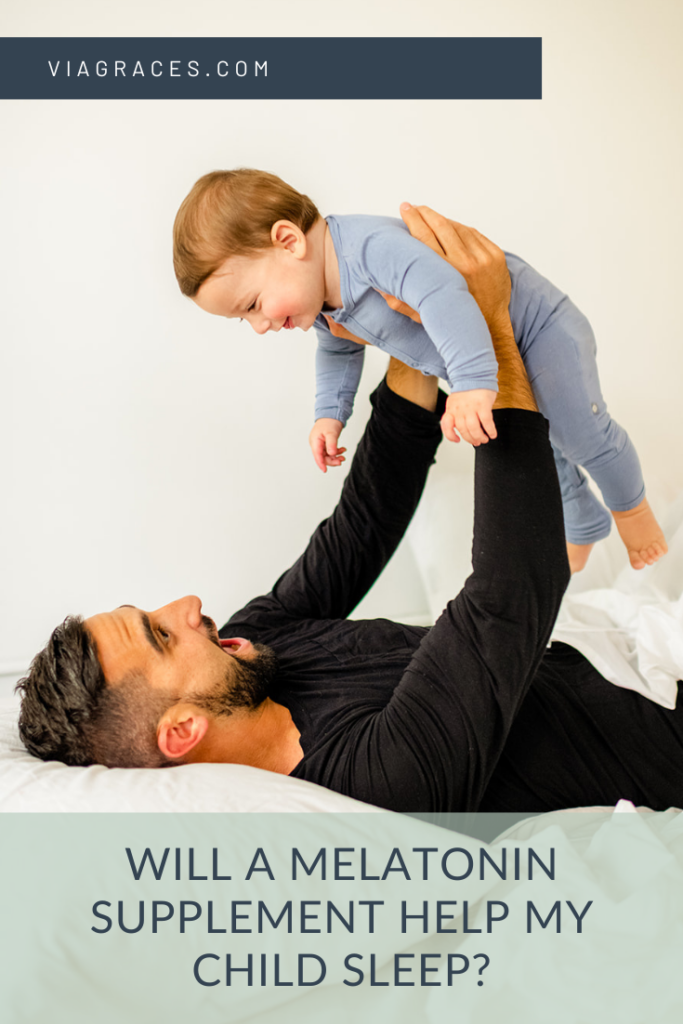Melatonin supplements for kids is a topic that comes up often in the pediatric sleep world. As a sleep consultant, I have had many families come to me whose toddlers or school-aged children are having trouble falling asleep on their own and/or staying asleep all night long, and they feel like they’ve tried everything they know to try, including a melatonin supplement.
And guess what? Even with that melatonin supplement, their child is still struggling with sleep, so they come to me.
So we work together to make sure their child’s sleep environment is conducive to sleep, we plan an age-appropriate schedule, we build consistent routines, and we walk through the how of teaching their little one to fall asleep and stay asleep in their own bed, all night long.
And after consistently carrying out that plan for a few weeks, TA DA – we’re there!
What about that meltonin supplement, you ask? More often than not, with their pediatrician’s approval, it’s no longer in the picture, or it’s on its way out. Because there’s so much more to solving a child’s sleep challenges than a melatonin supplement!
That’s why I’m so excited to have Wendy Warren, a Certified Pediatric Health and Wellness Coach, on the blog to talk about allllll things melatonin, including:
- What is melatonin?
- How does natural melatonin and sleep work together?
- Can a melatonin supplement help a child sleep better?
- What are scenarios when a melatonin supplement could really help a child?
- If kids take melatonin regularly or you want to stop, should they wean off or stop cold turkey?
- What are natural ways to assist in kids’ melatonin production?
And more!

Can you tell us a bit about melatonin?
Melatonin is a hormone that our bodies naturally produce. This hormone kicks in as the sun goes down, getting us ready to go to sleep for the night. This is correlated with our natural circadian rhythm, and why we start to feel tired as the evening/night approaches.
The natural darkness of the sun going down triggers this melatonin release. This is a good reason to keep an hour or two before bedtime mellow and dim, with low stimulation, and to keep screens off, or to a minimum. This allows the melatonin to increase fully and for us to get the best and deepest sleep.
There is ample science that shows exposure to screens and room lights before bedtime actually suppresses natural melatonin onset!
Starting at about 3 months old, melatonin starts to increase in higher amounts at night, and lower during the day. (This is good news for those babies who have their days and nights switched at birth!)
It should also be noted that it’s common to see newborn babies (under 3 months) going to bed naturally later in the evening than older kids – it’s because a newborn’s major time of melatonin production kicks in at 2am! Yikes!
For older babies and kids, melatonin peaks at 7-7:30pm. This is why it’s such a great bedtime for kids – they get the benefits of that high melatonin production, but also the benefit of deep restorative sleep. You’re not crazy if you’re noticed that your toddler/kid sleeps better all night long with an early bedtime of around 7-7:30pm.
What are your thoughts on using melatonin to help a child sleep better?
Firstly, always consult your medical provider if you’re concerned about your child’s sleep, or if you’re considering adding in a supplement such as melatonin.
If you’re having issues with your child’s sleep, melatonin is a band-aid approach.
When I use the word “band-aid,” I mean that it may provide a night or two of better sleep, but it is not fixing the problem.
It is advisable to get to the root cause of the sleep issues if you’d like long term solutions. Children should be sleeping soundly on their own, without aid, and if they are having sleeping issues, I would highly encourage you to seek the advice of a professional.
There is not a lot of science on the side effects of taking melatonin long term for adults or children, especially at the doses generally recommended. Most supplements for children start at 1 mg, and I have seen pediatricians recommend up to 3-5 mg for kids! Children’s bodies produce only 0.5-0.8 mg a day of melatonin. That is a lot to supplement with compared to what the body produces naturally. It is best to proceed with the utmost caution when taking synthetic hormones of any kind. We just don’t know the long term consequences.
Short term use of melatonin (which I will get into later) seems to be safe for most, but long term safety studies are very lacking.
There is much debate about this, and there is no consensus, but many health professionals believe that supplementing with melatonin long term can decrease your body’s naturally melatonin production. This would make sense, even if not backed by science currently.
Whether one believes in that line of thinking or not, you are still supplementing with a synthetic hormone, and any supplementation can and will derail the very delicate balance of our body creating hormones on its own. Our bodies are amazing machines that can reach a perfect homeostasis when given the correct environment and tools to do so. So, let’s figure out why our kids can’t sleep instead!
What is a scenario where you WOULD recommend melatonin for a child? Would that be a short-term solution or long-term?
There are a couple scenarios when I do give my older children 0.25-0.5 mg of melatonin. This is not medical advice, but only what I do after doing my own research.
My oldest son went through a period of time of not being able to sleep anywhere but home. He is and was a great sleeper at home, but nights away (vacations, trips, etc) were terrible, because he had such a hard time winding down and going to sleep. This is one case when I would use a small amount of melatonin to assist in him winding down for the evening. Now, at age 7, he does not have these issues anymore, thankfully!
There is also some new emerging and fascinating science behind melatonin assisting with chronic and acute health issues. Individuals with histamine issues, Mast Cell Activation Syndrome, inflammatory diseases, viral infections, even C-19 have been shown to benefit from supplementation of melatonin – it seems to decrease inflammatory and histamine response. It has been shown to be anti-inflammatory in the gut lining, as well as modulating immune response during times of acute sickness. These findings are still being researched.
For those reasons, I have seen good outcomes in my kids when they are coming down with something such as a head cold or flu, or if they’re feverish heading to bed. If one of my kids is having a tough day of spring allergies, I will also give a small dose before bed.
Now remember, these times are random and not regular. I do believe acute and strategic use is ok, but long term for sleep issues is not advisable.
Again, always consult your medical professional before supplementing anything, including melatonin.
If a child is taking melatonin regularly and the parents want to stop, do you recommend they stop cold turkey or should they wean them off?
I would advise weaning off of it, as this would allow your body to start adjusting easier. For example, if you are giving 1 mg per night, go to 0.75 mg and stay there for a few days until the child is sleeping well with that dose, and then decrease to 0.5, and so on.
This may not be necessary, but I do think this will help with the mental aspect of taking a supplement to sleep. Even if there is no physical dependency, it’s easy even for kids to get into the mentality of “I need this pill to be able to sleep!” and then they can have trouble sleeping because they are worried they won’t sleep if they don’t take it!
So if for no other reason, weaning down slowly can possibly avoid this.
Are there natural ways to help with a child’s melatonin production that doesn’t involve a melatonin supplement?
There are SO many things we can do to assist in melatonin production – for us and our kids!
Getting outside right when we wake up in the morning can (ideally our eyes being exposed to the sun first thing) can balance our circadian rhythm.
Getting outside throughout the day to get exercise is huge also! Our bodies are meant to move, jump, run, bounce, and play – and with these things lacking in our kid’s lives, sleep can really suffer.
Getting outside also assists our bodies in producing Vitamin D, which has been shown to assist with sleep regulation. Having a Vitamin D deficiency has been shown to cause sleep disturbances, and cause more night wakings in children – so don’t fear the sunshine!
A consistent sleep schedule and routine for kids works wonders in assisting their bodies to increase melatonin production at the appropriate time of day.
Avoid screens/TV/blue lights for 2 hours (if not longer) before bedtime. Remember what I mentioned above about screens decreasing melatonin production!
Tryptophan is a precursor to melatonin, and it’s found in food sources such as turkey, chicken, steak, some fish, oats, and eggs. I don’t usually give my kids bedtime snacks, but if I do, it’s always oatmeal or eggs.
About the Author

Hi! I’m Wendy and I’m a certified Pediatric Health and Wellness Coach. I’m a mother of 3 boys, ages 7, 4, and 21 months. I am passionate about children’s health and wellness.
When my oldest son was a baby, he developed head-to-toe eczema. He also had allergies, swollen eyes, rashes, colic, and reflux. After countless medical professionals told me his symptoms were “normal for babies,” my mama instinct told me otherwise. I took matters into my own hands, researched, asked questions, and I educated myself until I learned how to heal him from the inside out, all on my own.
I educated myself on gut health, children’s “toxic load buckets” and how it impacts everything in their lives, health, and happiness.
Now, I have made it my mission to share my knowledge with all the other mama bears out there, who are determined to improve their children’s health. Whether you’re local to Northern Virginia or not (I offer virtual consults, too!), I’d love to connect with you. You can email me here, and/or come hang out with me on Instagram!
